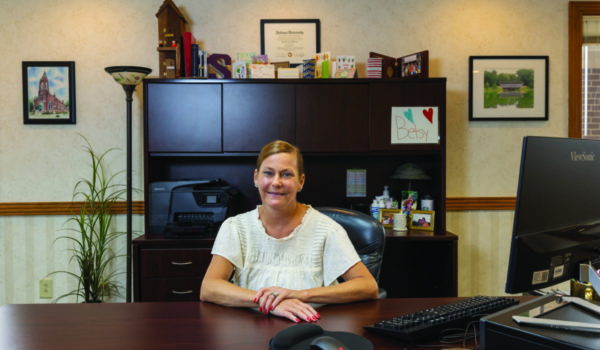
Tired but resilient, Betsy Swearingen and team help navigate county through pandemic
By Glenda Winders // Photography by Tony Vasquez
Betsy Swearingen’s husband, Chad, tells her that she enjoys her job more than anyone he has ever met. The reason she likes it, however, might give you the creeps.
Not long after graduating from Indiana University with a degree in environmental science, she took a job as a housing inspector for the Marion County Public Health Department. An incident that happened during a visit with her supervisor to a small home near the women’s prison in Indianapolis confirmed for her that she was in the right line of work.
The walls and floor of the house were literally crawling with cockroaches, and the stench was so bad that the pair had to put Vicks VapoRub under their nostrils to be able to stand it. Betsy says her supervisor was always impeccably dressed and groomed, but when he discovered the pilot lights on the resident’s furnace and hot water heater were out, he knelt in the filth to light them.
“It didn’t matter to him,” she says. “He was just worried about the woman. And that was the real beginning to my career in public health. I knew that’s what I wanted to do. I don’t think people know how many people live like that, and you have to have groups such as the health department to help them out because they don’t have anyone else.”
Along the way, Betsy — on the Johnson County Health Department website, she’s “Elizabeth” — met Chad Swearingen, a lifelong resident of Johnson County, who lived in Whiteland. A graduate of Indiana State University, he was also a housing inspector, and for a while the couple worked together. When they married in 1999, he had an 18-month-old daughter, Alexis, who is now 28. They went on to have Anna, now 20 and a junior at IU, and Olivia, 17, a junior at Roncalli High School. They have one grandchild, with another on the way in January.
“As the girls get older and we add more people to the family, it just gets better and better,” she says.
It’s in the air
Chad eventually left the health department to join an insurance company, and Betsy went on to become a licensed asbestos building inspector. She attended a radon conference in Washington, D.C., which John Bonsett — then the director of the Johnson County Health Department — was also attending. He appreciated her interest and knowledge in this area, and when a position as an environmentalist opened in 2002, he hired her.
“There was a growing awareness of indoor air quality, particularly with regard to radon, and (Betsy) was an indoor air quality specialist who was helping to lead the charge for that in Marion County,” Bonsett says. “We were just beginning to build our program, so we recruited her away to bring her expertise to Johnson County. We could see potential in her as an individual. She was smart and capable. She can multitask, and she’s good at what she does, and she’s a person with a lot of integrity.”
In the beginning, Betsy continued to do inspections of air quality, swimming pools and restaurants much as she had in her previous job. Then when Bonsett retired after 43 years as director, he tapped her to take over his role.
Today she manages a staff of 19 full- and part-time employees; oversees all the budgets; supervises the vital records division, which maintains all the birth and death records; and runs the Johnson County Emergency Medical Services Task Force, which partners with some long-term care facilities to protect vulnerable people in that demographic. She works closely with the nursing director to make sure both adults and children in the county get their vaccinations.
She’s trying to grow a mental health group to meet the need where she feels the county is severely lacking. She’d also like to pass a housing ordinance and environmental court where negligent landlords and homeowners could be assessed fines for not keeping their properties up to code. Other long-term goals include opening an employee health clinic and offering more services to help people who cannot afford a primary care doctor or day-to-day health care. Despite all she is doing now, however, she still goes out to do housing and indoor air inspections.
“I like to get out and stay active in the field,” Betsy says. “It gives me perspective on what my employees are doing on a daily basis, and it helps me maintain my sanity.”
She says the only places she doesn’t like to inspect are restaurants.
“Some of my people love doing food inspections, but I don’t,” she says. “When I became director, I said I wouldn’t do them, except for schools. I love my cafeteria ladies.”
Betsy is also the public health preparedness coordinator for the county, a position she inherited when Ruth Freese retired.
“Betsy constantly emphasizes the importance of teamwork,” Freese says. “She does excellent work on all the county, district and state teams she works on. The teams she built for both testing and vaccinating during COVID had to be set up and maintained rapidly, and she did an excellent job. She is a flat-out good person. She cares for all the people she works with and the health of all the communities in Johnson County.”
COVID comings and goings
Betsy was already busy before COVID-19 struck, but the pandemic changed everything. When the virus was discovered in other countries, the local emergency planning committee, of which she is a member, started to wonder if it would become an issue in Johnson County. When she told them it wasn’t a matter of if but when, her colleagues thought she was being pessimistic.
Then in January 2020 her youngest daughter landed in the hospital with a virus that couldn’t be identified.
“She wasn’t diagnosed with COVID because the testing wasn’t available then, but I wonder if it wasn’t an early case,” Betsy says.
The first diagnosed cases the department saw were a family, and one of them became the first death in Johnson County. Those cases crossed county lines and expanded exponentially from there.
“One death became 10, and 10 became 30, and then it was 20 in one day,” she says. “All we did every day was talk about COVID, learn about COVID, reach out to people who had COVID and try to quarantine those who had possibly been exposed to COVID in hopes that we could contain its spread.”
Betsy became an incident commander for the Johnson County Incident Management Team, a conglomeration of organizations in the county that had a vested interest in solving the problem: the fire department and EMTs, hospitals, politicians, mental health experts, police and the sheriff’s department. The team met biweekly to figure out how to get control of the situation. To this end they established protocols for the safety of first responders and for the response to anything COVID-related in the county.
“We educated ourselves and intertwined ourselves with other agencies in other counties so that we could be a united front to try to contain the spread,” she says. “That task force — that group of people working together — played a major role in keeping Johnson County as healthy as we could.”
When the whole world went into shutdown mode, the health department still came to work every day.
Scary, with some silver linings
“It was mentally and physically draining, and it was scary,” Betsy says. “When were we going to get it? Was it going to take out our whole office as it had taken out many other offices within Johnson County?”
But anxious as they were for their own well-being, they were still responsible for keeping people safe. Eventually it was their department that became responsible for enforcing the mask mandate.
“And then we just became hated,” Betsy says. “I became the soul-crusher for every bride by telling them no, they couldn’t have that many people, and no, they couldn’t have that big a venue and they had to wear masks. It was heartbreaking. I found no pleasure in it whatsoever.”
Part of her job was accepting safety plans from groups hoping to hold large gatherings and make sure they fit the criteria set out by Gov. Eric Holcomb and Dr. Christina Box, the state health commissioner. Today Betsy sits on Box’s advisory committee, and she says it is a pleasure to work with other administrators from throughout the state. The pandemic’s waning has also enabled her to find a few silver linings.
“This pandemic has brought the partners of Johnson County together,” she says. “We’ve learned more about their jobs and how they operate, and that makes us better when it’s time to help them maintain the public health of their departments and keep their employees safe. I had no idea how many divisions there were in law enforcement — the jail division in the sheriff’s department, juvenile probation vs. adult probation, and the courts and how they function. We’ve had an opportunity to cross-train, and I think that has been very beneficial for all of us working in the public sector.”
Although the past year has been the biggest challenge of Betsy’s career, it hasn’t been the only one. Twice — once in 2008 and again in 2017 — the department’s offices have been flooded and they’ve had to move. Currently they’re housed in a rented space on Morton Street in Franklin.
“We’re set to be here until April of 2023,” Betsy says. “And then we’ll be homeless again. We don’t know what that will look like. We’d love it if someone would build us a beautiful health department with everything we need. I’m praying on a daily basis for that to happen. This space is lovely and we’re privileged to be here, but we’ve outgrown it. With our hopes and plans to expand, we need a bigger, better facility that is conducive to helping our residents.”
She credits Bonsett and Craig Moorman, the former health officer, with being good stewards of the department’s funds and opening opportunities for outside funding to grow the department, especially in the area of preparedness. The nursing department now gets a grant for the Naloxone overdose drug that they can provide to first responders. The department owns an AM radio station for getting emergency preparedness information out to residents as well as a mobile command response vehicle and trailers and supplies to outfit three points of dispensing within the north, central and south areas of the county. They have lights and generators to be used in emergency situations and a decontamination trailer for use by individuals who need that service.
Personally speaking
Work isn’t the only place where Betsy has faced challenges, however. In 2015 she was diagnosed with breast cancer and underwent a lumpectomy, chemotherapy and radiation. Currently she is in year six of an anticancer drug she’ll take for 10 years in the hope the disease doesn’t come back in another form.
“I don’t wear pink, and I don’t march,” she says. “I think everybody’s experience with cancer is personal, and everybody deals with it in their own way. Mine was to take the support of my friends and family, get through it and move on. It has changed my outlook, though. Things I used to sweat before I don’t anymore because what really matters is doing what makes you happy and being with those you love and who are fun to be around. It taught me to be more real. I ask questions without judgment now. I may not like the answer, particularly having teenage children, but I’d rather know and understand than be stupid and judgmental. I have a fresh set of eyes on things.”
Betsy was born in Astoria, Ohio, where her dad worked for a division of Cummins Inc. The family moved to Columbus, Indiana, in 1978. She graduated from Columbus North High School, where she was a member of the track team and, until only recently, held the school record in the long jump. When the record was broken, her dad rescued the sign that had hung at the school, and now it adorns the wall in her garage.
“That was one of my proudest moments,” she says. “It seems trivial to find that important, but it was quite an accomplishment for me.”
In college she was on the steering committee for the IU Student Foundation and chairperson for Red Carpet Days, when newly admitted students and their parents visit to learn about the campus. She was also involved with the Little 500 bicycle race. She was a member of the IU chapter of Alpha Chi Omega sorority, as daughter Anna now is, too.
In the little free time Betsy has, she likes to swim and work out at the Shelby Baxter YMCA, where she and her husband are members. They are active at St. Jude’s Catholic Church, and they take part in weekly wiffle ball games with friends, family and neighbors in their cul-de-sac. She loves to play corn hole, and one of her favorite pastimes is playing Golden Tee video golf with Chad.
“I’m a terrible golfer, but I’m a great Golden Tee player,” Betsy says. “We play any chance we get.”
Before the pandemic she read a lot, especially books by Stephen King, but the past year and a half haven’t allowed time for much of that. She likes to eat out, and she and Chad like to travel. Even when they’re on vacation, though, she takes work with her.
“I’d rather work two hours a day while I’m away than come home to 500 emails,” she says.
But coming back to work brings its own rewards.
“I love these people I work with,” she says. “They’re my second family, and I feel honored that John chose me to take over. I may not always do it right, and I may not do it the way it has always been done, but I try to do my best, and I hope that shows.”
Not surprisingly, her greatest frustration is that her department has plenty of COVID vaccine, but people aren’t willing to take it.
“If you know there’s something that can keep you from becoming ill and possibly dying and it’s free and it won’t hurt you, why wouldn’t you get it?” she says. “Why wouldn’t you give it to your children? I think not getting it is very irresponsible.”
She says the pandemic showed her group that they were well prepared with regard to supplies and the ability to design, set up and operate well-run testing and vaccination sites. But future emergencies could be different.
“We had enough money, supplies and know-how this time,” she says, “and we have enough to keep going now but not enough if we would see a resurgence of the virus. We’re tired. It’s been a long 18 months.”


